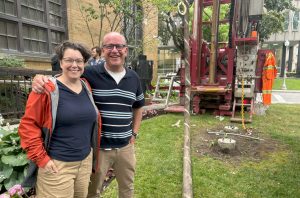Marianna Lasinska can only watch helplessly as her city of Mykolaiv in southern Ukraine comes under renewed Russian attack.
She and her 15-year-old daughter Martina, her only child, managed to flee Mykolaiv last spring and settle in Montreal this summer, leaving behind her husband, a doctor, who has been in the thick of the Ukrainian counter-offensive and her mother in the besieged city.
They are grateful for the support they have received from the Jewish community and other resources in Montreal, but mother and daughter long for the day they can return home. As Martina says, “I love my country so much.”
They never dreamed of having to leave their comfortable life that was suddenly and so brutally disrupted and, with no end in sight to the conflict, they live with uncertainty and worry.
“One day everything changed for us,” said Lasinska.
Mother and daughter were among about 50 Jewish Ukrainians who escaped the war and are now living in Montreal who attended a Sukkot celebration hosted by Federation CJA.
“The people are amazing,” said Lasinska. “They have helped us very much from the first day.” Her daughter adds, “They are like family.”
Mykolaiv, a port on the Black Sea considered strategically important, was the target of fierce Russian air strikes from Feb. 26, two days after the invasion, suffering widespread damage and civilian casualties.
Lasinska’s apartment took a direct hit, crumbling the structure. Getting out of Mykolaiv was not easy; it is on an island and the bridges were blocked. Travelling westward was perilous; their car was shot at, before they made it to Hungary and then Slovakia, where they obtained Canadian visas to join a friend in Montreal.
Although Ukrainian forces repelled the Russians by spring, Mykolaiv, which is near the occupied Kherson region, is again being shelled relentlessly.
Once a major Jewish centre, Mykolaiv has only a small community today in which Lasinska and Martina were active. Lasinska, who has a PhD, taught in the history department of Mykolaiv National University, specializing in Jewish history. Martina was a leader in Jewish youth activities and, fluent in English, was involved with international Jewish organizations.
So they were thrilled when Martina made contact through a Facebook group with Oxana Pasternak, a development officer with the RSJ (Russian Speaking Jewish) division of the federation, which has provided material aid and, more importantly, a sense of connectedness during this period of adjustment.
Marianna is happy that she has been able to continue to give classes online, while she takes French lessons. Martina attends École Secondaire Félix Leclerc on the West Island and went to Camp B’nai Brith this summer. Both are glad they can communicate almost daily with loved ones in Ukraine.
Martina, who is also learning French, finds her teachers and classmates understanding and open. It’s been especially difficult for a teen whose friends remain in Ukraine or are scattered to other countries.
While her mother wonders what is to come, Martina keeps her youthful optimism. “Our army is the best. My dad says we are so strong, no one expected that.”
Pasternak said the federation is aware of over 100 Ukrainian Jews who have arrived in Montreal since the war, most of them women and children or elderly people.
Soviet-born Mikhael Goldshtein, president of the RSJ division, said in Quebec the fleeing Ukrainians are able to get work and study permits and receive health care.
They have all experienced trauma. He said one woman told him it took her three days to reach the border from Kharkiv, literally crawling on the ground at times to escape the shooting.
“She was so happy when she crossed into Poland and saw all the Jewish and Israeli agencies there. She knew she was not alone,” he said.
Most of those here do not know whether they will stay or go back one day, he said.
“They left everything behind suddenly; often coming with one bag to start a new life thousands of kilometres away from home and relatives.” Most identify as Jews culturally and are not religious, but they appreciate the community’s outreach, Goldshtein added.
Rain prevented the dinner from being held in the sukkah in the federation courtyard, and was moved into the Gelber Centre. The guests were welcomed by Goldshtein who assured them the community cares and by Abba Brodt, federation director of impact partnerships and allocations, who explained the meaning of Sukkot.
A couple attending, Volodimir and Anastasia Shpitser, in Montreal since July, left Odesa for Israel two years ago with their three young daughters. They fear for their relatives still living in Ukraine, and he went back since the war to help some get out.
This was the first time they had attended a Jewish community event in Montreal, and said they did so mostly for their girls—a 4-year-old and twins aged 8. With plans to stay here permanently, they want to nurture their Jewish identity.
Also on hand was Rabbi Israel Sirota, longtime director of Chabad’s Jewish Russian Community Centre. He said several of the newcomers are living nearby, even though most are not religious. “They don’t know so much about Judaism, but we are going to teach them.”
The event was enlivened by the appearance of dozens of young people stopping by during a night of sukkah hopping, bearing bottles of vodka. They wished all a hag sameach and promised, “We are here for you if you need anything.”







